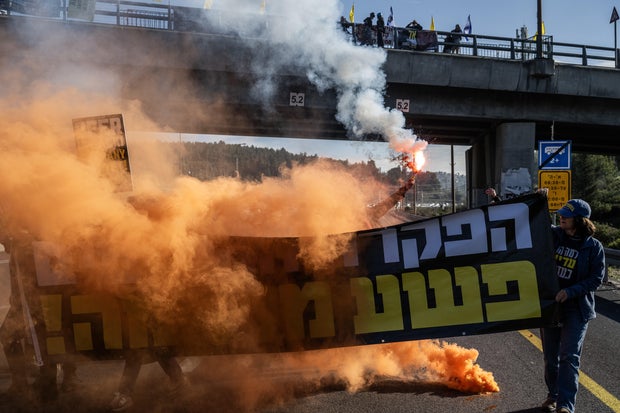Families of Israeli hostages still held in Gaza blocked traffic in Tel Aviv on Monday evening, panicked by Hamas saying it would delay the next scheduled release of hostages under the fragile ceasefire agreement that took effect on January 19.
Fear over the durability of the ceasefire and hostage release agreement was spreading fast on Tuesday, after President Trump suggested the terms of the deal should be changed in the wake of Hamas’ threat, and as Israel’s Defense chief said he was readying troops in Gaza for a possible return to combat.
The delicate halt in fighting, negotiated by the U.S., Qatar and Egypt, has seen five exchanges between Israel and Hamas thus far, with about half of the 33 Israeli hostages expected to be freed during the first six-week phase of the agreement now back home. More than 700 Palestinian prisoners have been released from Israeli jails in exchange.
Under the terms of the agreement, a total of 33 hostages were to be released during the first six-week phase, in exchange for about 2,000 Palestinian prisoners. But the families of the remaining 76 hostages — some of whom are already known to be dead — were left distraught by the developments on Monday, and by some devastating news confirmed later.
Mostafa Alkharouf/Anadolu/Getty
The Israel Defense Forces announced Tuesday that the oldest of the remaining captives, 86-year-old Shlomo Mantzur, had been murdered in captivity. He was a survivor of the 1941 pogrom in Iraq, in which hundreds were killed in an antisemitic riot.
It was with the last hostage release by Hamas, of three Israeli men on February 8, that the tone changed.
Israelis were left in anguish after seeing the emaciated state the men were in, and Prime Minister Benjamin Netanyahu’s office said in a statement that, “due to the serious condition of the three hostages and the repeated violations by the Hamas terrorist organization,” the leader had “instructed to not allow the situation to go unaddressed, and to take appropriate measures.”
There was no indication from Netanyahu’s office over the weekend what those measures might be, but on Sunday, the IDF said in a statement that troops had “operated to distance suspects who posed a threat to them in different areas of the Gaza Strip,” including warning shots fired at a “suspicious vessel” seen offshore and a suspect seen approaching troops in the south of the enclave.
The men released on Saturday, meanwhile, brought with them both welcome news, and some more distressing information. The family of hostage Alon Ohel learned that he is still alive, but that he’s starving, with untreated wounds and bound in chains, according to his mother.
“Thank you for the effort you and your staff are making to bring back the hostages,” Idit Ohel said, addressing Mr. Trump on Monday. “Today is Alon’s 24th birthday. I’m asking you with all my heart, do everything in your power to ensure that this deal is continued.”
The ceasefire agreement has also seen Israel allow hundreds of thousands of displaced civilians return to what’s left of their homes in the decimated north of Gaza. But many now fear the respite could be short-lived.
“People have begun to stock up on supplies for fear that war will return,” said Mohammad Yusuf, who lives in the badly scarred southern Gaza city of Khan Younis. “People are afraid of any statement, from both sides.”
That fear is taking hold not just in Gaza, but in the other, much larger Palestinian territory, the Israeli-occupied West Bank.
Residents there are already reeling from an Israeli operation to uproot Hamas that the military and police launched just several days after the ceasefire in Gaza came into effect. Violence against Palestinians by Israeli settlers in the territory has also been on the rise.
Residents told CBS News this week that they fear President Trump’s controversial plan to resettle all of Gaza’s residents in other countries and “take over” the coastal strip of land is only the beginning.
Even before Mr. Trump began his second term, his election win had already fueled discussion in Israel of the prospect of the complete annexation of the West Bank as Israeli territory.
“We will not leave our country,” insisted West Bank resident Maha Fathi Taleb. “We will not. Even if they shoot us. Let Trump do whatever he wants.”
contributed to this report.


